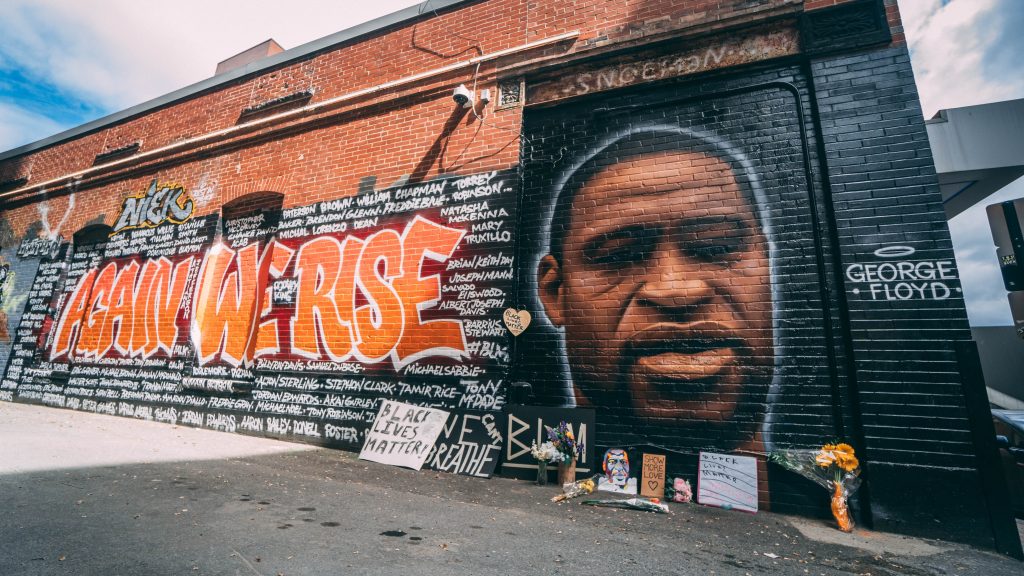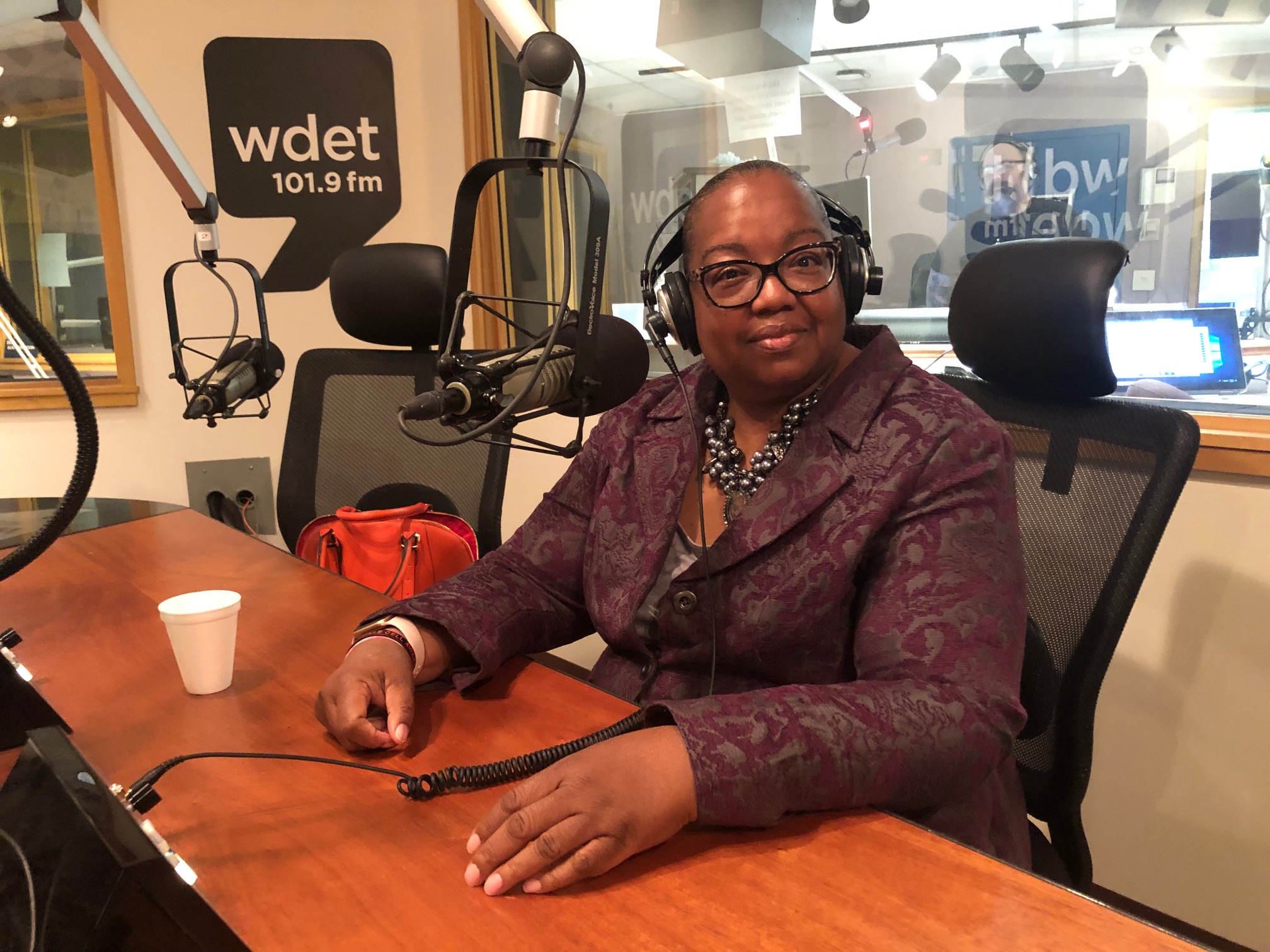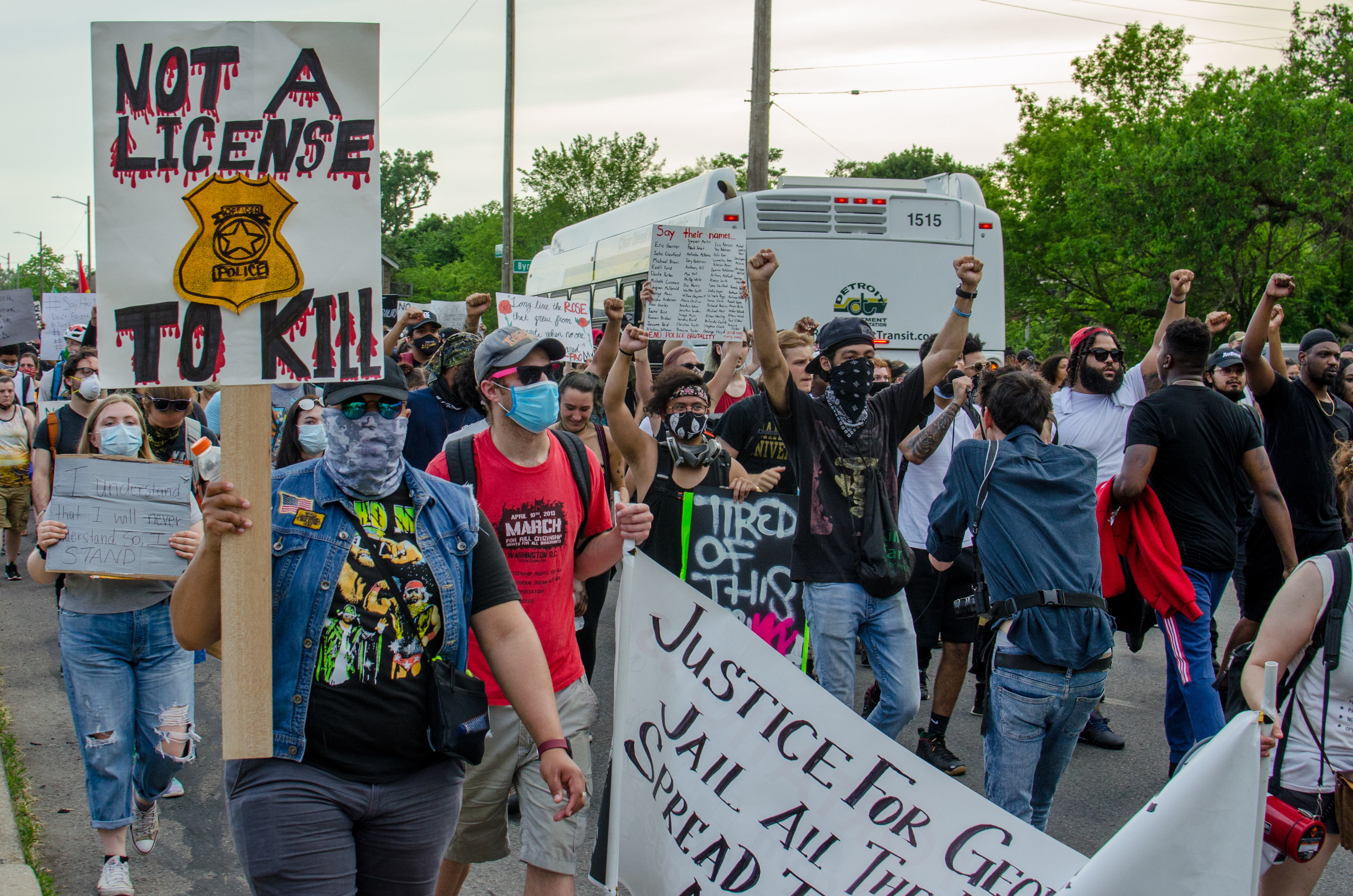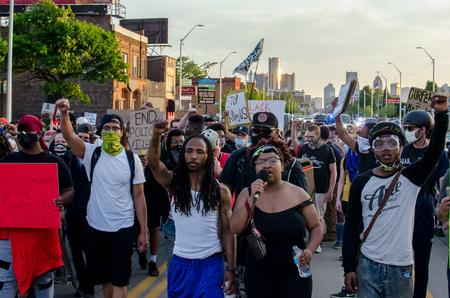Derek Chauvin Found Guilty On All Charges. Now What?
One “bad apple” was held accountable, but now advocates for reform are pushing for a system overhaul to break the cycle. Wayne County Prosecutor Kym Worthy, activist Caroline Randall Williams and author Alex Vitale discuss what’s next after the verdict.

Derek Chauvin has been found guilty on all counts in charges related to the death of George Floyd. Below is an essay on the verdict by Stephen Henderson read at the start of Detroit Today:
Derek Chauvin murdered George Floyd.
Derek Chauvin murdered George Floyd.
That truth has existed since Chauvin spent more than 9 minutes with his knee on Floyd’s neck in Minneapolis last spring. And it would still be true, even if a jury hadn’t yesterday convicted Chauvin of two murder counts and a manslaughter charge.
As much as it brings legal justice to this particular case, it signals an opportunity for more officers to be held more accountable when they recklessly or cruelly take Black lives in America.
But the gap would have been wider between what we know, and what we live in this country, had that jury not convicted. And we all know how many times we’ve seen that gap present itself, glare at us, and challenge us to the activism and speaking out that has defined the worldwide movement that Floyd’s murder inspired.
George Floyd was murdered.
George Floyd was murdered by a police officer.
George Floyd was murdered by a police officer who smirked and snarled while he literally choked the life out of Floyd.
It does feel good to be able to say that and know that the law has acknowledged as much today.
As much as it brings legal justice to this particular case, it signals an opportunity for more officers to be held more accountable when they recklessly or cruelly take Black lives in America.
This is an old song that plays over and over in our national ears. Police feel threatened or challenged by an African American or other person of color, and they act with extreme prejudice — shooting or choking or beating that person to death. And the refrain goes: no charges. Or reduced charges. Or, always an outrage, an acquittal.
From that initial lie to this moment, it has fallen too hard, too long, on people of strong will and determination to reach for the accountability and justice that the police were instantly trying to avoid after Chauvin killed Floyd.
It matters that this case was different. It matters that Minnesota’s highest ranking law enforcement official, Attorney General Keith Ellison, made sure Chauvin would not escape culpability. And it says to other officers, just a little, that they too could be held responsible for taking lives outside of emergency contexts.
Ellison, a native Detroiter, said as much yesterday, and his words undoubtedly will ring through police stations nationwide, and — we hope — will help inspire the massive re-thinking of policing that’s long overdue.
But as much as I’m hoping that’s true, as much as I NEED that to be true, for my 17-year-old son, for my 15-year-old daughter, for my friends and neighbors and fellow citizens — I know how far we still have to go on this issue.
I don’t just know it. I feel it.
I feel it whenever my son drives his car to school, or to work, or to sports practice.
I feel it whenever my daughter talks excitedly about her chance for mobile freedom, to be unfettered in the exploration of her city and world with a driver’s license, and a car.
Fear. That a police officer will see them only for the color they are, and that there’s not enough restraint — internal or external — on police to hold them back from the unimaginable.
It was instinct, on their part, to cover, to obfuscate, to lie, in order to protect their authority to kill at will. Justice had to go way too far, in this case, to conquer that instinct.
The thing that keeps popping into my head about George Floyd today is the way the Minneapolis police first described his murder, in the first reports of it.
The department said a suspect had died in a “medical incident” while being arrested.
A medical incident.
From that initial lie to this moment, it has fallen too hard, too long, on people of strong will and determination to reach for the accountability and justice that the police were instantly trying to avoid after Chauvin killed Floyd.
It was instinct, on their part, to cover, to obfuscate, to lie, in order to protect their authority to kill at will.
Justice had to go way too far, in this case, to conquer that instinct.
And this was too common a story in our nation.
It is the very water in which we all swim as Americans.
Justice. Today, yes. We have it.
But tomorrow? It’s not ever assured.
Listen: Stephen Henderson, Wayne County Prosecutor Kym Worthy, Poet Caroline Randall Williams, and Author Alex Vitale discuss what’s next after the Chauvin verdict
Guests

Kym Worthy is the Prosecuting Attorney for Wayne County. She says her office works to combat misconduct in policing. “We don’t charge when we can’t prove beyond a reasonable doubt … my office has a strong record of holding police accountable. We charged over 70 police officers for varying degrees of misconduct over the last few years,” says Worthy.
Despite Chauvin being found guilty on all charges, Worthy says it will take more than this trial to change the system. “We are talking about reforming policing and that has to be done. We have to look at use of force policy … and find more room for community input … we need to look at incentives to have police live in communities they work in …. Qualified immunity is also something we need to look at,” she says.
Caroline Randall Williams is an award-winning poet and activist, and a writer-in-residence at Vanderbilt University. She says she was relieved when she heard the verdict, but knew the work is far from over. “There’s ways in which this feels isolated because it does not represent a shift in the laws or the justice system …. the steps have not yet been taken.”
Williams says she feels cynical that this trial will create concrete change in American society. “I’ve been thinking a lot about Emmett Till…[systemic racism is] built into our foundation and I think if enough white Americans understood or empathized, this wouldn’t be happening.”
Williams says she hopes white Americans, who’ve never experienced systemic racism, will begin to understand the need for progress. “The way we witness has changed since the 90s…and since even before that…because of technology, people who never have seen this [violence] before are being forced to see it,” she says.
Alex Vitale is a Professor of Sociology at Brooklyn College and author of “The End of Policing.” He says this trial represented a rarity in holding police accountable.
“On one hand this verdict is the product of the movement, the outrage we’ve seen in the streets … when we see police departments from top to bottom turn out to support prosecution … that happens when there’s a legitimacy crisis for the system.”
Vitale says reforming the police is more than an internal process, it’s also political and cultural. “I don’t think this means we will magically or automatically see this transformation of policing … people are demanding we get solutions to these problems…that don’t involve violence,” he says.
Web story written by Nora Rhein
Local leaders and activists react

Following Tuesday’s verdict, about 50 protesters showed up to demonstrate in front of Detroit Public Safety Headquarters.
Shawn Vaughn of By Any Mean Necessary (BAMN), she says there is more work to do.
“I think this is the beginning. This is a good first step. But real justice comes from a leadership that’s building a movement to put power in the hands of the oppressed.”
Liana Mulholland, also with By Any Mean Necessary, says the support of millions of people in the streets for the past year had an effect on the jury.
“I just feel like it shows that marching in the street, building a movement is how you win justice in the courts. And had … all the unrest over the summer not happened, I don’t think we would have seen three guilty verdicts.”

Nakia Wallace helped co-found Detroit Will Breathe, a collective that’s been the main hub for the city’s Defund the Police movement. She says the work isn’t finished because of one verdict.
“Detroit Will Breathe is an organization that is a part of a larger movement. And so we go where the movement goes right?” she says. “We have no intentions of stopping the fight for Black and brown lives. We have no intentions of stopping, holding the state and the police accountable to the harm that they do to us.”
Detroit Police Chief James Craig says justice was done but says Derek Chauvin isn’t indicative of most officers.
“This is not reflective of our profession. The vast majority of men and women who serve every day, do it right.”
He says the jury got it right.
“Still a stain on our profession. We had to deal with weeks and months of at times violent protests. But on this day, the right thing was done.”
Craig is named in several civil rights lawsuits for the actions of his officers.
Reporting by Russ McNamara
Trusted, accurate, up-to-date
WDET is here to keep you informed on essential information, news and resources related to COVID-19.
This is a stressful, insecure time for many. So it’s more important than ever for you, our listeners and readers, who are able to donate to keep supporting WDET’s mission. Please make a gift today.
